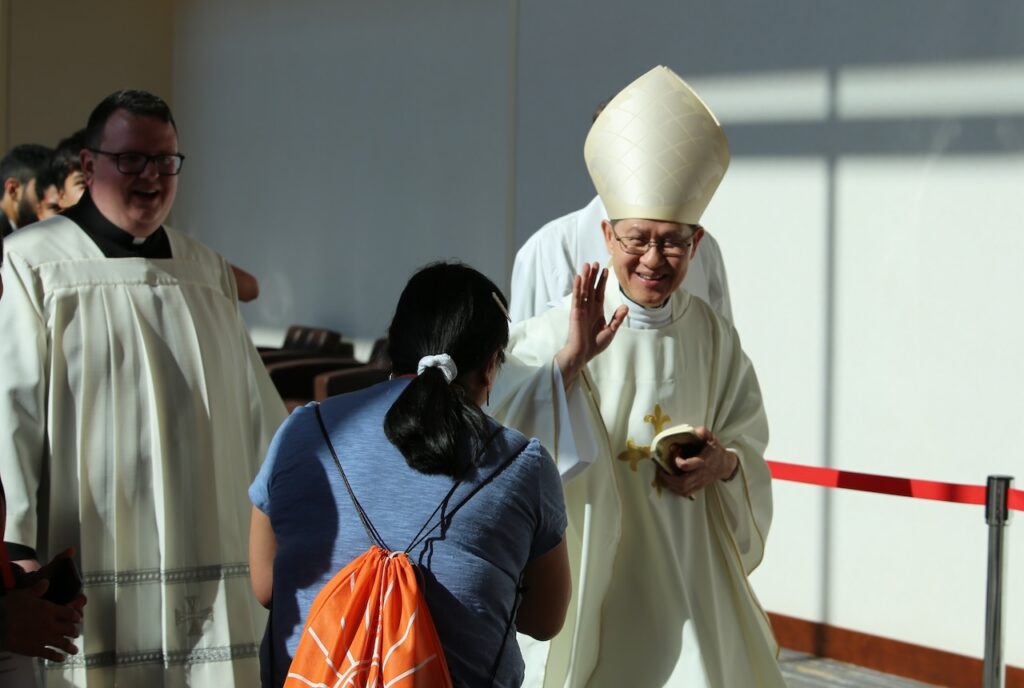INDIANAPOLIS (OSV News) – The 10th National Eucharistic Congress culminated with a Mass and commissioning on July 21. Luis Antonio Cardinal Tagle, the special envoy appointed by Pope Francis to the National Eucharistic Congress, and pro-prefect of the Dicastery for Evangelization, was the chief celebrant at Mass.
OSV News spoke with Cardinal Tagle in an exclusive interview, which has been edited for clarity and length.
OSV News: What is the message that Pope Francis wishes to convey to those participating at the congress?
Cardinal Tagle: He had many, many messages, but I think we can safely summarize them into two.
The first is to recover the sense of amazement, wonder and awe at the gift of the presence of the Lord in our midst through his word, especially through the Eucharist and in the Church.
But since this is a Eucharistic congress, the awe and wonder in beholding Jesus in the Eucharist, the celebration of the Mass, adoration, Pope Francis also (notes) that our contemporary culture is losing this sense of silence and adoration, which is always connected with the sense of wonder.
And I think that’s a good reminder, not just for Eucharistic devotion, but even for daily life, because we’re always rushing from one activity to another. … There’s no more time to pause, to behold, and to really appreciate what is unfolding before us.
Secondly, the Holy Father is also reminding all of us, especially the delegates to the congress, that our Eucharistic spirituality is related to evangelization, to mission. What you have experienced, what you have heard, the beauty that you have seen – go and share, go and share.
OSV News: How can we enkindle devotion to the Eucharist in a way that inspires Catholics to go out and do that evangelization and carry out the works of the Gospel?
Cardinal Tagle: I think part of it is formation, as we provide biblical and catechetical teaching to our faithful, beginning with the children in preparation for confirmation, first Communion.
We hope that the Eucharistic experience (would) be always connected with the sending of a disciple to share the Good News.
We cannot have a good experience and keep it to ourselves. No, that’s selfishness. That’s not discipleship.
If I have been touched by the Lord in the Eucharist who fulfills his promise – “I will be with you to the end of the ages” – that’s good news, not only for me, but for many people who are looking for an anchor in life, and who are misled because they think that fame, money, power will be with them to the end of time and will give them the security that they are looking for.
We also need to learn from the witness of the great saints and martyrs. The great saints and martyrs were all devoted to the Eucharist … how they prayed long, and how they searched for communities – even in mission areas, where they would walk, walk, walk to find a place where they could celebrate the Eucharist.
OSV News: What are some ways you have seen that are effective in meeting the challenges of fostering Eucharistic devotion?
Cardinal Tagle: There are some cultural or philosophical currents that have become like a mindset, where any religion, not just Christianity, is put on the sidelines. [Religion] is [seen as] a personal matter, an individual matter, and you don’t meddle with it. And that weakens the drive of people to really publicly commit themselves [to faith], especially the young.
Peer pressure is quite important. … So If they know a certain behavior would look funny, then they refrain from doing it or they hide it.
The other challenge is that there seems to be a growing tendency to say that freedom means allowing just anything – to go without any commitment, and then just wait for a time when you are ready for commitment.
But it is an open field without any guidance. You wonder how people would reach that point of decision with commitment, when all through the process they have not been presented with anything, with nothing (to inspire commitment). … And if you show that you have committed yourself, or you are on the way to a commitment, then [others] look at you as though something is wrong with you.
This does not impact only the Eucharistic life, but all other aspects of Church life, and the Eucharist is always connected to all of those aspects of life.
Now, these are just a few challenges. … But they can also be opportunities, and here I think the leaders of the Church, families, especially families, catechists, religious orders, must study very well what these currents are, what these mentalities are, and go deeper, because sometimes these mentalities are a cry for help, actually.
What I’m afraid of is that sometimes we critique, and rightly so, some of these currents – but maybe the critique must go deeper, into more of a compassionate reading of these currents, and to say, “Is there not something that you are looking for?”
And I think by doing so, we will also be surprised at how God could move.
Read more about the National Eucharistic Congress.

